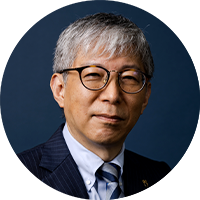Coach's VIEW is a business column authored by executive coaches in COACH A, aimed at providing valuable insights and effective approaches for leveraging coaching to foster organizational and leadership development. The column draws on the latest coaching trends and data, as well as insights from notable global publications on coaching.
Living with Questions

According to Harvard University education professor, Paul Harris, children between the ages of 2 and 5 ask approximately 40,000 questions (*1). This frequent questioning of their surroundings plays a crucial role in the cognitive development of children. It can be said that children truly live in a state of constant inquiry. However, as we grow older, we tend to lose this habit and the number of questions we ask declines in contrast to our childhood.
Why do we ask fewer questions?
Shifting from "Asking" to "Solving"
Hal Gregersen, director of MIT's Center for Leadership, points out that one contributing factor to the decline in questioning is its early deprivation (*2). This phenomenon is evident in classrooms, where teachers ask students an average of 84 questions per hour, while students pose only 2 questions in the entire class. In other words, schools' lessons often prioritize "solving" rather than "asking."
Upon entering the workforce after graduation, individuals often find themselves compelled to swiftly "solve" questions and provide answers. Society tends to value those who can efficiently and effectively "solve" problems. Consequently, as individuals progress, they tend to assign greater importance to the task of "solving" given questions quickly and effectively, rather than actively "asking" them.
Questions Are the Door to the Unknown
While there are various factors that contribute to the emphasis on "solving" over "asking," it is inherent in human nature to place a high value in finding solutions. As creatures, we tend to gravitate towards the familiar and seek certainty, avoiding the unpredictable and the mysterious. Neurologically, our brains react to uncertainty in a similar way to physical attacks, causing discomfort. To maintain a sense of comfort, we strive to eliminate uncertainty and constantly search for certainty, or what we perceive as a "solution."
On the other hand, the act of "asking" introduces instability and confusion. Questioning opens the door to an unpredictable world where familiar concepts and assumptions may be challenged. However, when we become too focused on "solving" without engaging in enough of "asking," we hinder new explorations. An excessive emphasis on "solving" deprives us of opportunities to encounter the unknown and can lead to stagnant thinking. Our relationship with the world becomes static, akin to a "frozen frame."
To Keep Asking Questions, to Hold Onto Solutions
Consider the distinction between a leader who continuously asks, "What is leadership?" and a leader who confidently asserts, "Leadership is about leading people," without reflecting on the question. The impact on those around them and their relationships can be markedly different.
Leaders who persistently ask, "What is leadership?" engage in a continuous exploration:
"How do I connect with my subordinates?"
"What qualities define a true leader?"
"What personal growth is necessary to enhance my leadership?"
They may seem ambiguous and uncertain at times, yet they embody authenticity and genuineness.
Conversely, leaders who cling to the fixed "solution" that "leadership is about leading" appear rigid and distant. They limit themselves by disregarding further inquiry.
Formulate a New Question in Response to a Question
Renowned philosopher, Tetsuya Kono, observed that those who believe they possess the ultimate solution tend to approach subjects technically and from a distance. In contrast, individuals who live with their questions have a magnetic attribute, attracting and involving others in their inquiries (*3).
This insight reveals a distinct way of life, where the focus lies not solely on "solving" questions but on continuously generating new questions in response to existing ones. However, as previously mentioned, embracing a life of questions can lead to a sense of suspension and instability. This sensation becomes more pronounced when we confront profound and essential questions. Consequently, there may be a natural inclination to shy away from choosing such a path.
Nevertheless, it is crucial to recognize the importance of transcending these fears and consciously opting to live with questions.
【REFERENCE】
*1 Ian Leslie, translated by Ayako Sugawa, “Curious: The Desire to Know and Why Your Future Depends On It”, Kobunsha, 2016
*2 Hal Gregersen, translated by Atsushi Kurowa, “Questions Are the Answer”, Kobunsha, 2020
*3 Tetsuya Kono, “When People Keep Talking, They Are Not Thinking: A Philosophy of Dialogue and Thinking”(人は語り続けるとき考えていない: 対話と思考の哲学), Iwanami Shoten, 2019
*4 Steven D'Souza & Diane Renner, “NOT KNOWING: The Art of Ignorance”, Nippon Jitsugyo Publishing, 2015
*Regardless of profit, non-profit or intranet, secondary use such as copying, diversion, selling etc. is prohibited without permission.
Language: Japanese

